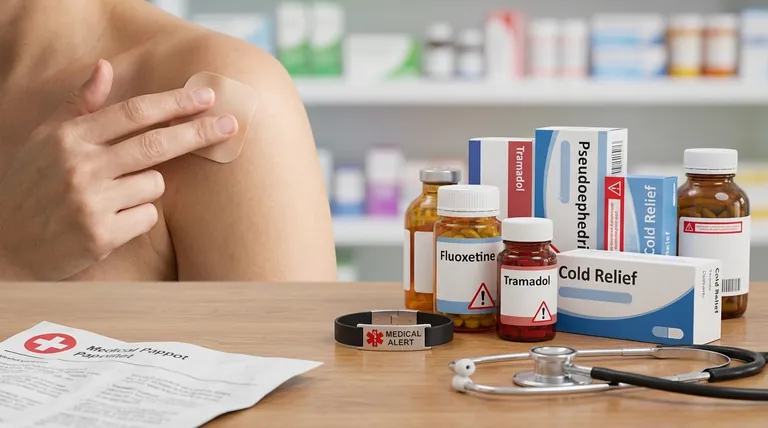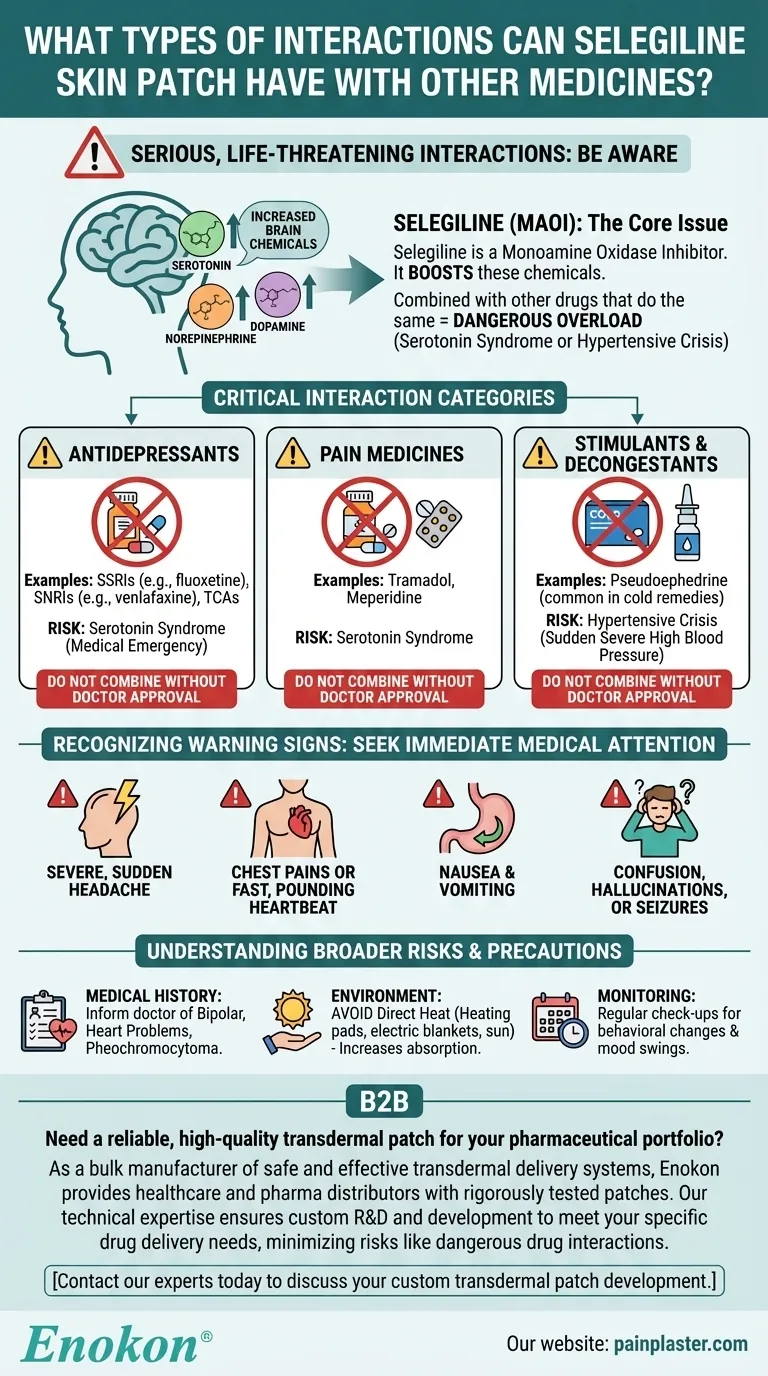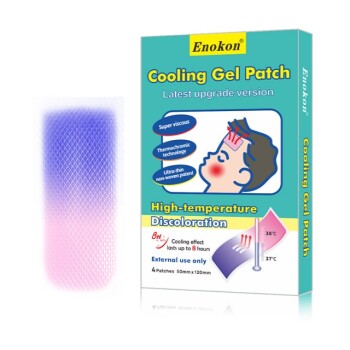To be clear, the selegiline skin patch can have serious, potentially life-threatening interactions with a wide range of common medicines. These include many types of antidepressants, certain pain relievers, and stimulants often found in over-the-counter cold remedies. Combining these can lead to dangerous medical emergencies.
The core issue is that selegiline is a Monoamine Oxidase Inhibitor (MAOI). It boosts certain brain chemicals, and when combined with other drugs that do the same, it can create a dangerous overload, leading to severe high blood pressure or a toxic condition known as serotonin syndrome.

Why These Interactions Happen
The Role of MAOIs
Selegiline belongs to a class of drugs called Monoamine Oxidase Inhibitors (MAOIs). This is the key to understanding its interactions.
Monoamine oxidase is an enzyme in your body responsible for breaking down neurotransmitters like serotonin, norepinephrine, and dopamine.
By inhibiting this enzyme, the selegiline patch causes levels of these powerful brain chemicals to increase, which is how it treats conditions like depression.
The Overload Risk
The danger arises when you take another medication that also increases these same neurotransmitters.
The combined effect can push the levels of these chemicals far too high, overwhelming your system and triggering a severe reaction.
Critical Drug Interaction Categories
You must be transparent with your doctor and pharmacist about every medication you take, including over-the-counter products and supplements.
Antidepressants
This is one of the most dangerous categories. Combining selegiline with other antidepressants like SSRIs (e.g., fluoxetine), SNRIs (e.g., venlafaxine), or TCAs can cause serotonin syndrome, a medical emergency.
Pain Medicines
Certain opioid pain relievers, such as tramadol and meperidine, can also increase serotonin levels and pose a significant risk of serotonin syndrome when taken with selegiline.
Stimulants and Decongestants
Common stimulants and decongestants (like pseudoephedrine found in cold medicine) can dramatically increase blood pressure. When combined with an MAOI like selegiline, this can lead to a hypertensive crisis—a sudden and severe spike in blood pressure that requires immediate medical attention.
Recognizing the Warning Signs
Knowing the symptoms of a serious interaction can be life-saving.
Symptoms of a Severe Reaction
If you experience any of the following, seek immediate medical attention:
- Severe, sudden headache
- Stiff neck
- Chest pains or a fast, pounding heartbeat
- Nausea and vomiting
- Confusion, hallucinations, or seizures
Common Side Effects
While less urgent, you should still report other side effects to your doctor. These can include dizziness, drowsiness, dry mouth, trouble sleeping, or skin irritation at the patch site.
Understanding the Broader Risks
Safe use of the selegiline patch extends beyond just drug interactions.
The Impact of Medical History
Certain pre-existing conditions increase your risk of complications. Always inform your doctor if you have a history of:
- Bipolar disorder, mania, or hypomania
- Heart problems or low blood pressure
- Pheochromocytoma (a type of adrenal gland tumor)
Environmental Precautions
Do not expose the patch to direct heat sources like heating pads, electric blankets, or prolonged direct sunlight. Heat can increase the amount of medication absorbed through your skin, raising the risk of side effects.
The Need for Monitoring
Regular check-ups are essential. Your doctor needs to monitor you for any behavioral changes, mood swings, or suicidal thoughts, which can be a rare but serious side effect of antidepressant medications.
How to Apply This to Your Situation
Your safety depends on clear and constant communication with your healthcare team.
- If your primary focus is starting this medication: Give your doctor and pharmacist a complete list of every single medicine, supplement, and over-the-counter product you use before you apply the first patch.
- If your primary focus is ongoing treatment: Never start a new medication—not even a simple cold or allergy remedy—without first clearing it with your doctor or pharmacist.
- If your primary focus is identifying a problem: Treat any sudden, severe headache, chest pain, or mental confusion as a medical emergency and seek immediate help.
Proactive communication with your healthcare provider is the single most effective tool for using selegiline safely and effectively.
Summary Table:
| Interaction Category | Examples of Drugs | Primary Risk |
|---|---|---|
| Antidepressants | SSRIs (e.g., fluoxetine), SNRIs (e.g., venlafaxine) | Serotonin Syndrome |
| Pain Medicines | Tramadol, Meperidine | Serotonin Syndrome |
| Stimulants/Decongestants | Pseudoephedrine (cold medicine) | Hypertensive Crisis |
Need a reliable, high-quality transdermal patch for your pharmaceutical portfolio?
As a bulk manufacturer of safe and effective transdermal delivery systems, Enokon provides healthcare and pharma distributors with rigorously tested patches. Our technical expertise ensures custom R&D and development to meet your specific drug delivery needs, minimizing risks like dangerous drug interactions.
Contact our experts today to discuss your custom transdermal patch development.
Visual Guide

Related Products
- Far Infrared Deep Heat Relief Patches Medicated Pain Relief Patches
- Capsaicin Chili Medicated Pain Relief Patches
- Asthma Cough and Pain Relief Patch for Adults and Kids
- Far Infrared Pain Patch Relief Pain Reliever for Back
- Menthol Gel Pain Relief Patch
People Also Ask
- How effective are pain relief patches for muscle pain? Target Localized Pain with Transdermal Delivery
- How do pain relief patches compare to other pain relief methods? Discover Targeted, Long-Lasting Relief
- What are pain relief patches and how are they used? A Guide to Safe, Targeted Relief
- How should pain relief patches be applied and used? A Guide to Safe & Effective Targeted Relief
- How do Deep Heat Pain Relief Patches provide pain relief? Discover the Drug-Free Mechanism















